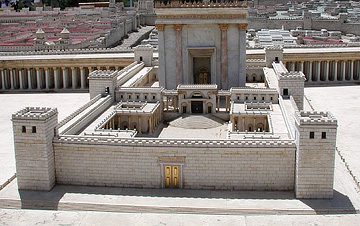The “Crime” of Jesus
My last post in this series focused on the reasons why some Jewish leaders in Jerusalem believed that it was necessary for Jesus to die. The bottom line? He was a threat to their conception of faith and national life, indeed, to the very existence of the Jewish people. If left unchecked, Jesus would either pervert the Jewish nation with his peculiar notions of the kingdom of God, or he would bring down the wrath of Rome upon Judea, leading to its destruction. Either way, Jesus needed to be taken out of the game – permanently.
The concerns of the Jewish leaders, however pressing they might have been, would probably not have been enough to bring about Jesus’ execution except for something Jesus himself did, something shocking, unexpected, and utterly unacceptable from the perspective of the Jewish leaders. I’m speaking of his activity in the temple, that which Christians call “the cleansing of the temple.” Here’s Mark’s account of this scandalous action:
Then they came to Jerusalem. And he entered the temple and began to drive out those who were selling and those who were buying in the temple, and he overturned the tables of the moneychangers and the seats of those who sold doves; and he would not allow anyone to carry anything through the temple. He was teaching and saying, “Is it not written, ‘My house shall be called a house of prayer for all the nations’? But you have made it a den of robbers.” (Mark 11:15-17)
How did the Jewish leaders respond to Jesus’ action? “And when the chief priests and the scribes heard it, they kept looking for a way to kill him” (Mark 11:18).
Why was Jesus’ behavior in the temple worthy of death?
First of all, he was suggesting that the current state of the temple was unacceptable and that the temple leadership – the chief priests – were unworthy of respect. They were like a bunch of robbers.

Second, Jesus actually prohibited the crucial function of the temple: the offering of sacrifices. From the point of view of the priests, he was keeping the Jewish people from worshipping God in the way God had prescribed – a serious if not a capital offense.
Third, Jesus’ activity in the temple was consistent with his earlier actions, whereby he implied that the temple was no longer necessary. If Jesus himself could forgive sins (Mark 2:1-12), then why bother with the temple? Thus Jesus was saying to a temple-centered religion: The very center of your relationship with God is wrong. Such a critique would not be taken lightly by those who embraced a temple-centered Judaism.
But it wasn’t only what Jesus did in the temple that provoked a negative response from the leaders, but also what he said. You see, by referring to the temple as a “den of robbers,” Jesus was doing far more than insulting the chief priests. He was actually quoting from the prophet Jeremiah. In Jeremiah 7, the prophet condemned the tendency of Israel to put their faith in the existence of the temple. Many in Jeremiah’s day believed that they could do all sorts of evil deeds without fear of punishment because God’s temple was in their midst. The temple was their spiritual safety net, so to speak. But God was neither fooled nor pleased. So, through Jeremiah the Lord prophesied,
Here you are, trusting in deceptive words to no avail. Will you steal, murder, commit adultery, swear falsely, make offerings to Baal, and go after other gods that you have not known, and then come and stand before me in this house, which is called by my name, and say, “We are safe!” – only to go on doing all these abominations? Has this house, which is called by my name, become a den of robbers in your sight? . . . And now, because you have done all these things, says the LORD, . . . therefore I will do to the house that is called by my name . . . just what I did to Shiloh. (Jer 7:8-14)
And what did the Lord do to Shiloh? He destroyed it and the tabernacle it once housed (Psalm 78:60).
In the day of Jeremiah, the people had turned the temple into a “den of robbers,” a place of supposed safety for those who did evil deeds out in the world. For this reason, God promised to destroy the temple, which he did in 586 B.C. Similarly, by quoting from Jeremiah 7 as he overturned the tables in the temple, Jesus implied that the same judgment applied in his day. Those who took refuge in the temple could not presume to be safe. God was about to destroy the temple because of the sin of the people, even as he had done to Shiloh and to the first temple in Jerusalem.
Thus Jesus’ action in the temple, combined with his words, not only insulted and upset the chief priests, but also conveyed God’s judgment upon the temple itself. This crime against the temple could not be tolerated, as far as its leaders were concerned. Jesus, the blasphemous criminal, deserved, not only to be silenced, but also to die. In my next post I’ll examine two fascinating parallels that will help us to see that the Jewish leaders who condemned Jesus were acting in ways fully consistent with their predecessors and successors. Right or wrong, they were doing exactly what Jewish leaders in their position had done and would do again. They thought they were defending God’s temple and, indeed, God himself.

